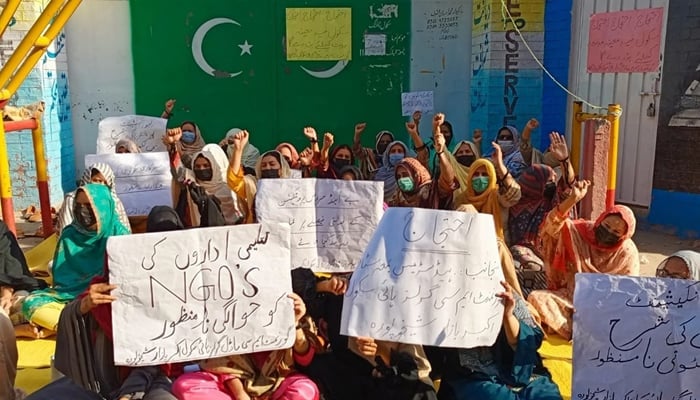Decoding protests: Why teachers took the lead
THE RECENT PROTESTS by government employees, particularly school teachers, in the provincial metropolis garnered considerable attention in the headlines due to the arrests of the protesters, with a significant number of them being teachers.
All those arrested, mostly teachers, were later released but this column is an attempt to delve into two key aspects of the protests. First, it will examine why the majority of protesters were teachers, despite the fact that the demonstrations were organized by the All Government Employees Grand Alliance (AGEGA) and included employees from some other departments. Secondly, it will unravel the intricacies surrounding the issue of school privatization, shedding light on its significance within the context of these protests.
It is pertinent to mention here that among the three major demands put forth by the protesters under AGEGA platform, it's intriguing to note that two of them, the amendment to pension regulations and the cessation of leave encashment, were directly related to all government employees. However, it was the teachers who emerged as the driving force behind these protests, and several compelling factors lie at the heart of this phenomenon.
First and foremost, teachers constitute a significant portion of the government workforce, making them a formidable and influential group. Their sheer numbers allowed them to exert considerable pressure on the government, compelling it to take notice like they always do.
Secondly, teachers have historically proven to be more organised and disciplined when it comes to collective actions and protests. Their experience in mobilising for a cause has given them an edge in orchestrating effective demonstrations and ensuring their demands are heard.
Thirdly, teachers benefit from a unique advantage – their working hours which allow them to join such protests in person. As they are typically free around noon, after school hours, they can readily participate in demonstrations and other forms of collective action.
And also unlike many other government establishments, where leadership positions are often held by officers from federal or provincial bureaucracies, in schools, the head is primarily a teacher. Consequently, teachers are more likely to have the support of their school heads in advocating for their cause in public demonstrations.
This availability sets them apart from many other government employees who may find it challenging to attend protests during their work hours. On top of that these school teachers also enjoy support from their colleagues in colleges and universities who recently also issued statements to support their cause.
These factors combined to make teachers a powerful force in the recent protests, drawing significant attention to the issues of pension regulations and leave encashment that affected not only them but the entire government workforce.
On the other hand, the protesters’ claim vis-à-vis privatisation of schools may not hold water when we examine the facts. There has been no significant recent policy shift regarding school privatization; instead, what's happening is the ongoing 'outsourcing' of public schools to the private sector under a public-private partnership model. This practice has been in effect for many years. In fact there is a dedicated government body for this purpose the Punjab Education Initiatives Management Authority (PEIMA) which was established under Punjab Education Initiatives Management Authority (PEIMA) Act 2018.
Therefore, the teachers' concern about school privatisation doesn't seem justified at this point. Their real grievances lie elsewhere, and they may be using the privatization issue as a way to garner public support for their protests.
-
 Prevent Cancer With These Simple Lifestyle Changes
Prevent Cancer With These Simple Lifestyle Changes -
 Experts Reveal Keto Diet As Key To Treating Depression
Experts Reveal Keto Diet As Key To Treating Depression -
 Inter Miami Vs Barcelona SC Recap As Messi Shines With Goal And Assist
Inter Miami Vs Barcelona SC Recap As Messi Shines With Goal And Assist -
 David Beckham Pays Tribute To Estranged Son Brooklyn Amid Ongoing Family Rift
David Beckham Pays Tribute To Estranged Son Brooklyn Amid Ongoing Family Rift -
 Jailton Almeida Speaks Out After UFC Controversy And Short Notice Fight Booking
Jailton Almeida Speaks Out After UFC Controversy And Short Notice Fight Booking -
 Extreme Cold Warning Issued As Blizzard Hits Southern Ontario Including Toronto
Extreme Cold Warning Issued As Blizzard Hits Southern Ontario Including Toronto -
 Lana Del Rey Announces New Single Co-written With Husband Jeremy Dufrene
Lana Del Rey Announces New Single Co-written With Husband Jeremy Dufrene -
 Ukraine-Russia Talks Heat Up As Zelenskyy Warns Of US Pressure Before Elections
Ukraine-Russia Talks Heat Up As Zelenskyy Warns Of US Pressure Before Elections -
 Lil Nas X Spotted Buying Used Refrigerator After Backlash Over Nude Public Meltdown
Lil Nas X Spotted Buying Used Refrigerator After Backlash Over Nude Public Meltdown -
 Caleb McLaughlin Shares His Resume For This Major Role
Caleb McLaughlin Shares His Resume For This Major Role -
 King Charles Carries With ‘dignity’ As Andrew Lets Down
King Charles Carries With ‘dignity’ As Andrew Lets Down -
 Brooklyn Beckham Covers Up More Tattoos Linked To His Family Amid Rift
Brooklyn Beckham Covers Up More Tattoos Linked To His Family Amid Rift -
 Shamed Andrew Agreed To ‘go Quietly’ If King Protects Daughters
Shamed Andrew Agreed To ‘go Quietly’ If King Protects Daughters -
 Candace Cameron Bure Says She’s Supporting Lori Loughlin After Separation From Mossimo Giannulli
Candace Cameron Bure Says She’s Supporting Lori Loughlin After Separation From Mossimo Giannulli -
 Princess Beatrice, Eugenie Are ‘not Innocent’ In Epstein Drama
Princess Beatrice, Eugenie Are ‘not Innocent’ In Epstein Drama -
 Reese Witherspoon Goes 'boss' Mode On 'Legally Blonde' Prequel
Reese Witherspoon Goes 'boss' Mode On 'Legally Blonde' Prequel




